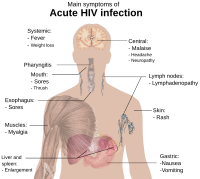
Photo from wikipedia
Symptom science has been a priority for nurse researchers for some time. Both the National Institute for Nursing Research (NINR; Cashion, Gill, Hawes, Henderson, & Saligan, 2016) and leading nurse… Click to show full abstract
Symptom science has been a priority for nurse researchers for some time. Both the National Institute for Nursing Research (NINR; Cashion, Gill, Hawes, Henderson, & Saligan, 2016) and leading nurse scientists in the United States and around the world have focused on developing science to help explain, predict, and manage symptoms. Efforts by nurse scientists to advance symptom science include descriptive studies of symptom manifestations in various disease conditions, symptom prevention and treatment interventions, and mechanistic studies designed to discover the underlying biobehavioral processes associated with symptom occurrence and severity (Corwin et al., 2014). Symptoms, defined asphysical ormental characteristics of a condition or disease, are part of individual perception, meaning their occurrence may not be observable to others. Thus, symptoms such as pain and fatigue are typically self-reported. This raises a challenge for thosewho are studying or providing care for individuals who cannot communicate their symptom experience such as very young children, individuals who are sedated or unable to speak due to their physical condition, and older adults with severe dementia. Consequently, caregivers, professional and personal, often need to observe for physiological or behavioral indicators of symptom expression. Efforts to develop systems that allow caregivers to identify correctly when a symptom is experienced and with what degree of intensity are important to reduce suffering and improve quality of care. Recent research supports the use of caregiver assessment in conjunctionwith self-reported symptom experience (Mileviciute & Hartley, 2015). Understanding relationships among symptoms is also important. Symptom cluster research has aided our understanding of the complex nature of many symptoms, which typically do not “travel alone.” For example, pain, fatigue, and depressive symptoms often co-occur, particularly in certain health conditions such as cancer. Strategies examining how symptoms cluster together have been promulgated (Miaskowski, 2016), which has led to increased understanding of the symptom experience and particularly the symptom burden associated with severe and/or chronic health conditions. Understanding the mechanisms underlying symptom occurrence and severity is also of importance in order to develop interventions that prevent or treat symptoms. Much of our understanding of symptom mechanisms come from basic research, including cellular and molecular studies. However,
Journal Title: Nursing Research
Year Published: 2020
Link to full text (if available)
Share on Social Media: Sign Up to like & get
recommendations!